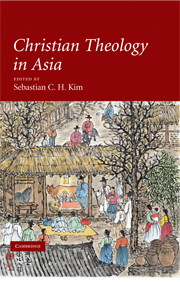Book contents
- Frontmatter
- Contents
- Contributors
- Preface and Acknowledgements
- 1 FORMATION OF CHRISTIAN THEOLOGIES IN ASIA
- 1 Introduction: mapping Asian Christianity in the context of world Christianity
- 2 The Mystery of God in and through Hinduism
- 3 Waters of life and Indian cups: Protestant attempts at theologizing in India
- 4 From abandonment to blessing: the theological presence of Christianity in Indonesia
- 5 Studying Christianity and doing theology extra ecclesiam in China
- 6 Christian theology under feudalism, nationalism and democracy in Japan
- 7 The Word and the Spirit: overcoming poverty, injustice and division in Korea
- II THEOLOGICAL THEMES OF CHRISTIANITY IN ASIA
- Index
- References
7 - The Word and the Spirit: overcoming poverty, injustice and division in Korea
Published online by Cambridge University Press: 05 June 2012
- Frontmatter
- Contents
- Contributors
- Preface and Acknowledgements
- 1 FORMATION OF CHRISTIAN THEOLOGIES IN ASIA
- 1 Introduction: mapping Asian Christianity in the context of world Christianity
- 2 The Mystery of God in and through Hinduism
- 3 Waters of life and Indian cups: Protestant attempts at theologizing in India
- 4 From abandonment to blessing: the theological presence of Christianity in Indonesia
- 5 Studying Christianity and doing theology extra ecclesiam in China
- 6 Christian theology under feudalism, nationalism and democracy in Japan
- 7 The Word and the Spirit: overcoming poverty, injustice and division in Korea
- II THEOLOGICAL THEMES OF CHRISTIANITY IN ASIA
- Index
- References
Summary
INTRODUCTION
Christianity first arrived in Korea not through foreign missionaries but through a Korean scholar. In the eighteenth century Lee Seng-Hoon went to China to study, where he met a Jesuit missionary. Lee eventually became a Christian and was baptized in Peking in 1784. He returned to Korea and started to share his Christian faith, which led to many conversions. In 1789, when Jesuit missionaries first entered Korea, they discovered that there were already about four thousand Catholic Christians on the Korean peninsula. The Catholic Church grew rapidly, but between 1801 and 1867 it faced great persecution because of the refusal of Christians to practise ancestor veneration or worship, which was regarded as essential for national stability, and because of accusations that the Christians were in contact with European imperial powers. The persecution of 1866 was especially severe; about eight thousand Christians were martyred, and almost the same number later starved to death when they fled to the mountains. The country remained closed to the outside world until the Japanese imposed a trade agreement in 1876.
While the Korean peninsula was still closed, several Protestant missionaries who were working in China became interested in Korea. In 1832 K. A. Gützlaff briefly visited Korea, as did Robert Thomas in 1865 and 1866 (suffering martyrdom on his latter visit). The reports of their encounters drew the attention of other missionaries, who ventured into this hidden kingdom.
- Type
- Chapter
- Information
- Christian Theology in Asia , pp. 129 - 154Publisher: Cambridge University PressPrint publication year: 2008
References
- 2
- Cited by



